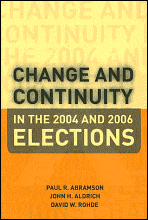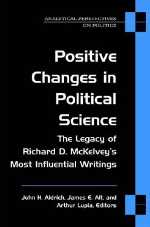 |
Change
and Continuity in the 2004 and 2006 Elections
What
lessons can be drawn from the 2004 elections, and how do they
apply to the 2006 contests? Can Democrats successfully translate
President Bush’s low approval ratings into control over
Congress? In careful analysis of both contests, the authors
evaluate strategies and their impact on the outcome of the midterm
elections. This updated edition, available in March, examines
structural changes Republicans developed to help them in House
contests, assesses how candidates decide whether or not to challenge
incumbents, and discusses how tactics used in 2006 may come
to dominate the 2008 presidential nomination contests. Hillary
Clinton’s prospects both as a candidate for the Democratic
nomination and for the general election as well as the strengths
and weaknesses of the relatively large number of potential Republican
candidates receive measured analysis.
Employing
many data sources, the authors examine the actual midterm election
results and then turn to their analysis of the National Election
Study surveys. As with all books in the Change and Continuity
series, the authors present election data in a straightforward,
accessible manner and make sure to incorporate and discuss the
most recent research literature.
Order
this book online |
 |
Positive Changes in Political Science: The Legacy of Richard D. McKelvey's Most Influential Writings
Richard D. McKelvey was a pioneer in the use of mathematical modeling for understanding the nature of political choices. Positive Changes in Political Science brings together his most important articles, accompanied by original essays from contemporary political scientists, some his colleagues or students, who reflect upon his contributions, their continuing relevance today, and how they are still shaping research for the future.
Order
this book online |
